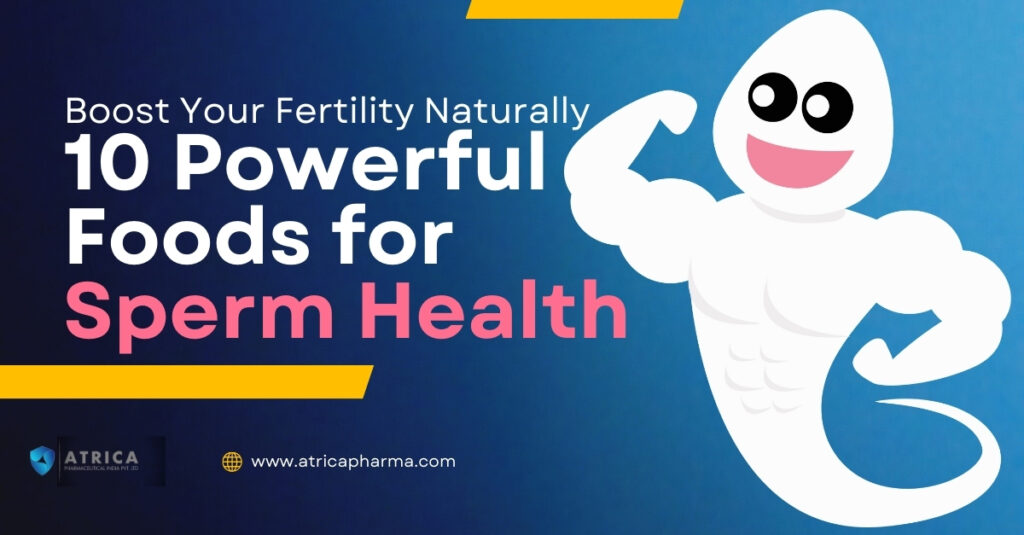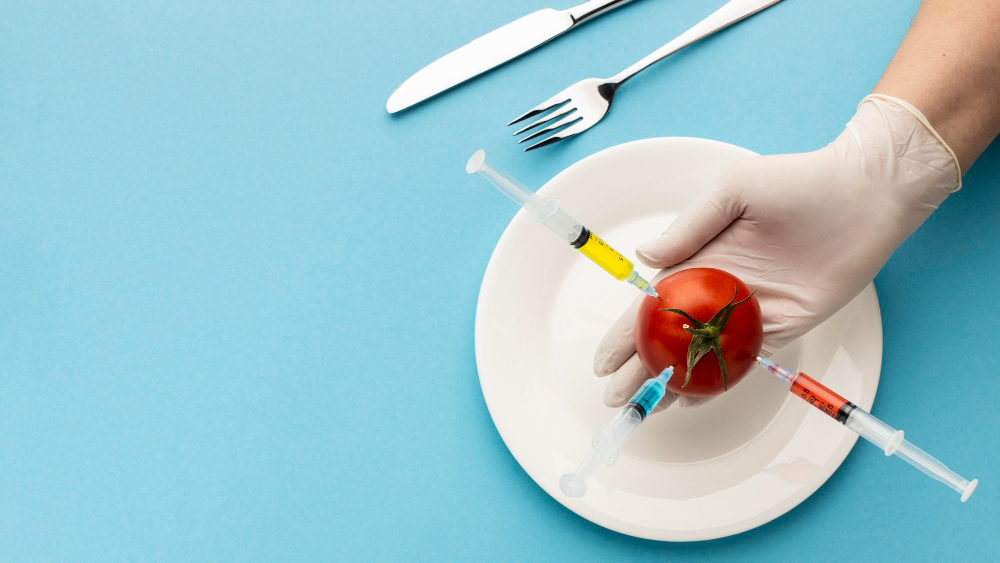
10 Powerful Foods for Sperm Health: Boost Your Fertility Naturally
Foods for Sperm Health: Welcome to a comprehensive exploration of the critical role that sperm health plays in male fertility. In this section, we delve deep into the intricate mechanisms governing reproductive success and the pivotal importance of sperm quality within this process.
Picture This: Millions of tiny cells, each carrying the potential to create life, embarking on a remarkable journey within the male reproductive system. These cells, known as sperm, hold the key to conception, making their health and vitality paramount in the quest for parenthood.

Sperm health encompasses various factors, including sperm count, motility (movement), morphology (shape), and overall functionality. Optimal sperm quality is not only essential for fertilizing an egg but also for ensuring the health and viability of the resulting embryo.
For couples aspiring to conceive, understanding the intricate interplay between sperm health and fertility is vital. Factors such as genetics, lifestyle choices, and environmental influences can profoundly impact sperm quality, highlighting the importance of adopting strategies to support and enhance male reproductive health.
Throughout this article, we embark on a journey to uncover the secrets to promoting and maintaining optimal sperm health. From exploring the nutritional factors that influence sperm production to debunking common myths surrounding male fertility, we arm you with the knowledge and insights needed to navigate the path to parenthood with confidence.
So, whether you’re embarking on the journey of conception or simply seeking to optimize your reproductive health, join us as we unravel the mysteries of sperm health and unlock the potential for a future filled with fertility and joy.
Nutritional Impact on Sperm Health: Nourishing the Seeds of Fertility

In this section, we embark on a journey to uncover the profound influence of nutrition on the health and vitality of sperm. Just as a well-tended garden yields abundant harvests, nourishing the body with the right nutrients lays the foundation for robust sperm production and function.
Think of sperm as tiny voyagers, navigating the complex terrain of the male reproductive system in search of their ultimate destination—the egg. Like any travelers, these miniature explorers require fuel and sustenance to embark on their journey with vigor and determination.
Enter nutrition, the cornerstone of sperm health. From essential vitamins and minerals to powerful antioxidants and healthy fats, the nutrients we consume play a pivotal role in shaping the quality and viability of sperm. By understanding the nutritional landscape and making conscious dietary choices, individuals can empower themselves to optimize their reproductive health and enhance their chances of conception.
Throughout this exploration, we’ll uncover the specific nutrients that hold the key to promoting sperm production, enhancing motility, and safeguarding DNA integrity. From zinc and selenium, the guardians of sperm vitality, to omega-3 fatty acids, the champions of membrane integrity, each nutrient plays a unique and indispensable role in nurturing the seeds of fertility.
So, whether you’re embarking on the journey of parenthood or simply seeking to bolster your reproductive health, join us as we delve into the world of nutrition and unlock the secrets to vibrant sperm health. Together, let’s cultivate a fertile ground where the seeds of life can flourish and thrive.
Foods for Enhancing Sperm Health: Nourishing Your Reproductive Potential

Fish rich in omega-3 fatty acids:
Dive into the world of omega-3 fatty acids, the unsung heroes of sperm health. Found abundantly in cold-water fish like salmon, mackerel, and trout, these essential fats play a pivotal role in maintaining the structural integrity of sperm cell membranes. By incorporating omega-3-rich fish into your diet, you provide your body with the building blocks needed to support optimal sperm motility and viability.
Nuts and seeds for zinc and selenium:
Unlock the potential of nuts and seeds as nutritional powerhouses for sperm health. Laden with zinc and selenium, these crunchy delights serve as essential nutrients for sperm production and function. Almonds, walnuts, pumpkin seeds, and sunflower seeds offer a delectable way to boost your intake of these vital minerals, fortifying your reproductive health and vitality from within.
Fruits and Vegetables Loaded with Antioxidants:
Immerse yourself in a rainbow of colors with fruits and vegetables teeming with antioxidants. From vibrant berries to leafy greens and citrus delights, these nutrient-packed treasures provide your body with a potent arsenal against oxidative stress. Antioxidants like vitamin C, vitamin E, and beta-carotene help shield sperm from DNA damage, ensuring their resilience and longevity on their journey to fertilization.
Whole grains for essential vitamins and minerals:
Embrace the wholesome goodness of whole grains as a cornerstone of sperm health. Brimming with essential vitamins and minerals like B vitamins, magnesium, and zinc, whole grains such as oats, quinoa, and brown rice offer a nourishing feast for your reproductive system. By fueling your body with these nutrient-rich grains, you lay the groundwork for robust sperm production and vitality.
Lean protein sources for amino acids:
Elevate your protein game with lean sources that pack a punch for sperm health. Whether it’s poultry, eggs, or legumes, these protein powerhouses provide your body with the amino acids essential for sperm development and function. By incorporating lean protein into your diet, you ensure that your reproductive system receives the building blocks it needs to thrive, setting the stage for optimal fertility and reproductive success.
Embark on a culinary adventure as you discover the bountiful array of foods for sperm health, that hold the key to enhancing your sperm health. With each delicious bite, you nourish not only your body but also your reproductive potential, paving the way for a future filled with fertility and joy.
Lifestyle Choices and Sperm Health: Cultivating Fertility through Mindful Living

Embarking on the journey of optimizing sperm health involves more than just dietary adjustments; it requires a holistic approach that encompasses lifestyle choices. In this section, we delve into the interconnectedness between lifestyle factors and sperm health, empowering you to make informed decisions that support your reproductive well-being.
Imagine your lifestyle as the soil in which the seeds of fertility are planted. Just as nutrient-rich soil nurtures the growth of vibrant plants, mindful lifestyle choices create an environment conducive to robust sperm production and function. By cultivating habits that promote overall health and well-being, you lay the groundwork for a fertile ground where reproductive potential can flourish.
Let’s explore the various lifestyle factors that influence sperm health:
Avoidance of harmful substances: Steer clear of tobacco, alcohol, and recreational drugs, as these substances can impair sperm production and quality. By eliminating or reducing exposure to these harmful agents, you safeguard your reproductive health and enhance your fertility potential.
Maintaining a healthy weight: Strive to achieve and maintain a healthy weight through regular physical activity and balanced nutrition. Obesity and being underweight can both negatively impact sperm parameters, highlighting the importance of maintaining a healthy body mass index (BMI) for optimal reproductive function.
Stress management techniques: Incorporate stress-reducing practices such as meditation, yoga, and deep breathing exercises into your daily routine. Chronic stress can disrupt hormonal balance and impair sperm production, underscoring the importance of finding healthy outlets for stress relief.
Quality sleep: Prioritize adequate sleep duration and quality to support reproductive health. Poor sleep habits and sleep disorders have been linked to decreased sperm quality and fertility, emphasizing the need for restorative sleep as part of a healthy lifestyle.
By making mindful lifestyle choices, you not only enhance your own well-being but also cultivate an environment conducive to optimal sperm health and fertility. Through conscious decision-making and self-care practices, you empower yourself to nurture the seeds of fertility and pave the way for a future filled with reproductive vitality and joy.
Hydration and Sperm Health

In this section, we delve into the often-overlooked role of hydration in supporting optimal sperm health and function. Just as water sustains life and vitality in all living organisms, adequate hydration is essential for maintaining the health and vitality of sperm cells.
Picture your body as a well-oiled machine, with each component dependent on proper lubrication to function efficiently. Similarly, sperm cells rely on adequate hydration to navigate the intricate pathways of the male reproductive system with precision and vigor.
Consider this: semen, the fluid that carries sperm, comprises a significant portion of water. Therefore, ensuring adequate hydration is crucial for maintaining the proper viscosity and volume of semen, factors that directly impact sperm motility and fertility.
By prioritizing hydration, you provide your body with the essential fluid it needs to support the production, transport, and delivery of sperm. Whether it’s through plain water, herbal teas, or hydrating fruits and vegetables, quenching your body’s thirst is a simple yet powerful way to optimize your reproductive health.
So, as you reach for that glass of water or slice of juicy watermelon, remember that you’re not just hydrating your body; you’re nourishing the seeds of fertility within. By embracing hydration as a cornerstone of your reproductive wellness regimen, you pave the way for a future filled with robust sperm health and the potential for joyful parenthood.
Myth Busting: Common Misconceptions about Sperm Health: Separating Fact from Fiction
In this section, we embark on a journey to dispel the myths and misconceptions surrounding sperm health, empowering you with accurate information to make informed decisions about your reproductive well-being.
Imagine a landscape dotted with misinformation, where myths and misconceptions thrive like weeds among the fertile soil of truth. Our mission is to uproot these falsehoods and cultivate a garden of knowledge where clarity and understanding flourish.
Let’s shine a light on some of the most pervasive myths about sperm health:
Myth: Boxer shorts are better for sperm production than briefs.
Fact: While it’s commonly believed that tight underwear can increase scrotal temperature and harm sperm production, research has shown that there’s no significant difference between boxers and briefs in terms of sperm quality. The key is to wear underwear that feels comfortable and allows for adequate ventilation.
Myth: Certain foods for sperm health, that can dramatically increase sperm count overnight.
Fact: While a balanced diet rich in nutrients is essential for sperm health, there’s no magical food that can instantly boost sperm count. Improving overall nutrition over time, along with adopting a healthy lifestyle, can positively impact sperm quality and fertility in the long term.
Myth: Hot tubs and saunas can permanently reduce sperm count.
Fact: Exposure to extreme heat, such as prolonged sessions in hot tubs or saunas, can temporarily lower sperm production. However, sperm levels typically return to normal once the body has cooled down. It’s essential to avoid prolonged exposure to high temperatures if you’re trying to conceive, but occasional use is unlikely to have a lasting impact on sperm count.
Myth: Tight-fitting clothing can impair sperm production.
Fact: While excessively tight clothing may increase scrotal temperature, there’s limited evidence to suggest that it significantly affects sperm production or quality. It’s essential to wear clothing that feels comfortable and allows for adequate airflow, but there’s no need to avoid snug-fitting attire altogether.
By debunking these myths and separating fact from fiction, we empower you to make informed choices about your reproductive health. Armed with accurate information, you can navigate the landscape of fertility with confidence, setting the stage for a future filled with vitality and possibility.
Integrating Sperm-Boosting Foods into Daily Diet – Foods for Sperm Health
In this section, we embark on a journey to discover practical and delicious ways to incorporate sperm-boosting foods for sperm health, into your daily diet. By making conscious choices and embracing a variety of nutrient-rich ingredients, you can nourish your body and support optimal sperm health with every meal.
Imagine your plate as a canvas, waiting to be adorned with vibrant colors and wholesome flavors that nourish both body and soul. With each bite, you have the opportunity to fuel your fertility journey and cultivate a fertile ground where the seeds of life can flourish.
Let’s explore some simple yet effective strategies for integrating sperm-boosting foods into your daily diet:
Start with a balanced breakfast: Kickstart your day with a nutritious breakfast that sets the tone for optimal sperm health. Incorporate foods for sperm health like whole grain cereals, Greek yogurt, and fresh fruits to provide your body with essential vitamins, minerals, and antioxidants.
Power up with protein: Make protein a cornerstone of your meals by including lean sources like poultry, fish, tofu, and legumes. These protein-packed foods provide the amino acids necessary for sperm development and function, helping to fuel your reproductive vitality.
Load up on fruits and vegetables: Embrace the rainbow of colors offered by a variety of fruits and vegetables, each bursting with its own unique blend of vitamins, minerals, and antioxidants. From leafy greens to brightly colored berries, aim to fill half your plate with these nutrient-rich treasures to support sperm health and overall well-being.
Incorporate Healthy Fats: Don’t shy away from incorporating healthy fats into your diet, as they play a crucial role in maintaining sperm membrane integrity and hormone production. Include sources of omega-3 fatty acids like fatty fish, flaxseeds, and walnuts, as well as monounsaturated fats found in avocados and olive oil.
Snack Smartly: Opt for nutrient-dense snacks that provide sustained energy and support your reproductive health. Nuts, seeds, yogurt, and whole grain crackers are excellent options that can help keep hunger at bay while nourishing your body with essential nutrients.
By embracing these simple yet effective strategies, you can seamlessly integrate sperm-boosting foods into your daily diet and support your reproductive health from within. With each mindful choice, you take a step closer to cultivating a fertile ground where the seeds of life can thrive, paving the way for a future filled with fertility and joy.
Supplements for Sperm Health: Enhancing Fertility with Targeted Nutrition
In this section, we explore the role of supplements in supporting sperm health and optimizing fertility. While a balanced diet forms the foundation of reproductive wellness, certain supplements can provide targeted support to address specific nutritional needs and promote optimal sperm production and function.
Imagine supplements as specialized tools in your fertility toolkit, each serving a unique purpose to bolster your reproductive vitality. By understanding the potential benefits and considerations associated with these supplements, you can make informed choices that align with your reproductive goals.
Let’s delve into some key supplements for sperm health and fertility:
Omega-3 fatty acids: Omega-3 fatty acids, found in fish oil supplements, are renowned for their anti-inflammatory properties and their ability to support sperm membrane integrity and motility. By supplementing with omega-3s, you can ensure that your body receives an adequate supply of these essential fats, which may be lacking in the diet of some individuals.
Antioxidants: Antioxidant supplements, such as vitamin C, vitamin E, and coenzyme Q10, help combat oxidative stress and protect sperm from DNA damage. By neutralizing harmful free radicals, antioxidants can enhance sperm quality and viability, potentially improving fertility outcomes for couples trying to conceive.
Zinc: Zinc is a critical mineral for sperm production and testosterone metabolism. Supplementing with zinc can help correct deficiencies and support healthy sperm development. Men with suboptimal zinc levels may benefit from supplementation to optimize their reproductive health.
Selenium: Selenium is another essential mineral that plays a crucial role in sperm formation and function. Supplementing with selenium can help protect sperm from oxidative damage and improve overall sperm quality. However, it’s essential to avoid excessive supplementation, as high doses of selenium can be toxic.
Folic acid: Folic acid, a B vitamin, is known for its role in fetal development and pregnancy health. However, emerging research suggests that folic acid may also benefit sperm health by reducing chromosomal abnormalities and improving sperm DNA integrity. Men looking to optimize their fertility may consider supplementing with folic acid as part of a comprehensive approach to reproductive wellness.
While supplements can offer targeted support for sperm health, it’s essential to approach supplementation with caution and consult with a healthcare professional before starting any new regimen. Individual needs vary, and excessive supplementation can have adverse effects on reproductive health. By working closely with a knowledgeable healthcare provider, you can tailor a supplement regimen that meets your unique needs and supports your journey to parenthood.
Role of Genetics in Sperm Health: Unraveling the Genetic Blueprint of Fertility
In this section, we embark on a journey into the intricate world of genetics and its profound impact on sperm health and fertility. By exploring the genetic factors that influence reproductive function, we gain valuable insights into the underlying mechanisms that shape our reproductive potential.
Imagine genetics as the intricate tapestry of instructions that governs every aspect of our being, from physical traits to physiological processes. Within this tapestry lies a wealth of information about our reproductive health, encoded within our DNA and passed down through generations.
Let’s unravel the genetic blueprint of fertility and delve into the role of genetics in sperm health:
Inherited traits: Certain genetic factors inherited from parents can influence sperm production, morphology, and motility. Variations in genes related to hormone receptors, sperm development, and chromosomal structure can impact reproductive function and fertility outcomes.
Genetic disorders: Genetic abnormalities or mutations can disrupt normal sperm development and function, leading to fertility issues. Conditions such as Klinefelter syndrome, Y chromosome microdeletions, and cystic fibrosis gene mutations can affect sperm production and increase the risk of infertility.
Epigenetics: Beyond the genetic code itself, epigenetic modifications play a crucial role in regulating gene expression and shaping sperm health. Environmental factors, lifestyle choices, and even paternal experiences can influence epigenetic patterns in sperm, potentially impacting fertility and offspring health.
Genetic testing: Advances in genetic testing technologies allow for the identification of genetic variations associated with male infertility. Genetic testing can help diagnose underlying genetic causes of infertility, guide treatment decisions, and provide valuable insights into family planning and reproductive risks.
Hereditary conditions: Certain hereditary conditions or genetic syndromes can affect male fertility and reproductive health. Understanding the genetic basis of these conditions can inform personalized treatment approaches and help individuals make informed decisions about family planning.
By unraveling the complex interplay between genetics and sperm health, we gain a deeper understanding of the factors that shape our reproductive destiny. While genetics play a significant role in determining fertility outcomes, they do not necessarily dictate our reproductive future. By embracing advances in genetic testing and personalized medicine, we empower ourselves to take control of our reproductive health and navigate the journey to parenthood with confidence and resilience.
Environmental Factors and Sperm Health: Navigating the Modern World’s Impact on Fertility
In this section, we delve into the intricate relationship between environmental factors and sperm health, exploring how our modern surroundings can influence reproductive function and fertility outcomes. By understanding the potential risks posed by environmental exposures, we empower ourselves to make informed choices that safeguard our reproductive well-being.
Picture the world around us as a vast ecosystem, teeming with a multitude of influences that shape our daily lives. From the air we breathe to the products we use, environmental factors play a significant role in determining our overall health and vitality, including reproductive health.
Let’s explore some of the key environmental factors that can impact sperm health:
Chemical exposures: Exposure to environmental pollutants, such as pesticides, heavy metals, and industrial chemicals, can disrupt hormonal balance and impair sperm production and quality. Chemicals found in everyday products like plastics, personal care products, and household cleaners may contain endocrine-disrupting compounds that can interfere with reproductive function.
Pollution and air quality: Poor air quality, resulting from vehicle emissions, industrial pollutants, and airborne particulate matter, can negatively impact respiratory health and may also affect sperm quality. Studies have linked air pollution exposure to reduced sperm motility, DNA damage, and increased risk of infertility.
Radiation exposure: Radiation from sources such as X-rays, electromagnetic fields (EMFs) from electronic devices, and ionizing radiation from medical procedures can potentially damage sperm DNA and impair fertility. Occupational exposure to radiation, as well as lifestyle factors like frequent use of mobile phones and laptops, may contribute to reproductive risks.
Temperature extremes: Prolonged exposure to extreme temperatures, whether from hot tubs, saunas, or occupational settings, can temporarily decrease sperm production and quality. Heat stress on the testicles can disrupt spermatogenesis and affect sperm motility, highlighting the importance of avoiding excessive heat exposure, particularly for men trying to conceive.
Lifestyle factors: Beyond external environmental influences, lifestyle choices such as smoking, excessive alcohol consumption, and poor dietary habits can also impact sperm health. These lifestyle factors can contribute to oxidative stress, inflammation, and hormonal imbalances, all of which can adversely affect reproductive function.
By recognizing the potential impact of environmental factors on sperm health, we can take proactive steps to minimize exposure and mitigate risks. From adopting eco-friendly practices to making conscious choices about the products we use, each action we take contributes to creating a healthier environment for ourselves and future generations. By prioritizing reproductive health in our daily lives, we pave the way for a future where fertility is protected and celebrated as a precious gift.
Holistic Approaches to Improving Sperm Health: Nurturing Fertility from Within
In this section, we embark on a holistic journey to explore integrative approaches to enhancing sperm health and optimizing fertility. By embracing a comprehensive approach that addresses the interconnectedness of mind, body, and environment, we empower ourselves to cultivate a fertile ground where reproductive vitality can flourish.
Imagine sperm health as a reflection of overall well-being, influenced by a multitude of factors ranging from physical health to emotional balance and environmental harmony. Holistic approaches recognize the importance of nurturing each aspect of our being to support optimal reproductive function and fertility.
Let’s explore some holistic strategies for improving sperm health:
Nutritional optimization: Start by nourishing your body with a balanced diet rich in whole foods for sperm health, including fruits, vegetables, lean proteins, and healthy fats. Incorporate sperm-boosting nutrients like zinc, selenium, omega-3 fatty acids, and antioxidants into your meals to support sperm production and quality.
Lifestyle modifications: Adopt lifestyle habits that promote overall health and well-being, such as regular exercise, stress management techniques, adequate sleep, and avoidance of harmful substances like tobacco and excessive alcohol. By prioritizing self-care and mindfulness, you create an environment conducive to reproductive vitality.
Environmental detoxification: Minimize exposure to environmental toxins and pollutants by choosing organic foods for sperm health, using natural household and personal care products, and reducing reliance on plastics and other sources of chemical exposure. Creating a clean and healthy living environment can help protect sperm health and fertility.
Mind-body practices: Explore mind-body practices like meditation, yoga, acupuncture, and massage therapy to promote relaxation, reduce stress, and balance hormonal levels. These holistic modalities can help harmonize the body’s systems and optimize reproductive function from within.
Supplementation: Consider incorporating targeted supplements into your routine to address specific nutritional needs and support sperm health. Consult with a healthcare professional to determine the most appropriate supplements for your individual circumstances, taking into account factors such as genetic predispositions, dietary habits, and lifestyle factors.
By embracing holistic approaches to improving sperm health, we honor the interconnectedness of our physical, emotional, and environmental well-being. Each step we take towards nurturing our fertility from within brings us closer to realizing our reproductive potential and creating the foundation for a future filled with joy, vitality, and abundance.
Seeking Professional Help for Fertility Concerns
In this section, we explore the importance of seeking professional assistance when faced with fertility concerns, highlighting the valuable support and resources available to individuals and couples on their journey to parenthood. By recognizing the expertise and guidance offered by fertility specialists, we empower ourselves to overcome obstacles and pursue our dreams of starting or expanding our families.
Embarking on the path to parenthood can be both exciting and challenging, particularly for those who encounter difficulties conceiving. When faced with fertility concerns, it’s essential to remember that you are not alone, and there are dedicated professionals ready to offer compassionate care and expert guidance every step of the way.
Let’s delve into the reasons why seeking professional help for fertility concerns is crucial:
Specialized expertise: Fertility specialists, including reproductive endocrinologists and fertility doctors, possess specialized training and expertise in diagnosing and treating a wide range of reproductive issues. Their in-depth knowledge and experience enable them to develop personalized treatment plans tailored to each individual or couple’s unique needs.
Comprehensive evaluation: Fertility clinics offer comprehensive diagnostic testing and evaluation to identify underlying causes of infertility and develop targeted treatment strategies. From semen analysis and hormone testing to imaging studies and genetic screening, these assessments provide valuable insights into the factors affecting fertility.
Access to advanced treatments: Fertility clinics offer a wide range of advanced treatment options for individuals and couples struggling with infertility. These may include assisted reproductive technologies such as in vitro fertilization (IVF), intrauterine insemination (IUI), and fertility preservation techniques like egg freezing. By leveraging cutting-edge technologies and innovative approaches, fertility specialists can help overcome infertility obstacles and increase the likelihood of achieving pregnancy.
Emotional support: Dealing with fertility challenges can take an emotional toll on individuals and couples, leading to feelings of stress, anxiety, and uncertainty. Fertility clinics often provide counseling and support services to help patients navigate the emotional aspects of infertility and cope with the ups and downs of the fertility journey. From support groups to individual counseling sessions, these resources offer a safe space for expressing concerns, sharing experiences, and finding solace in community.
Empowerment through education: Fertility clinics empower patients with knowledge and education about their reproductive health and treatment options. Through personalized consultations, educational materials, and access to online resources, patients gain a deeper understanding of their fertility status and the steps involved in achieving their family-building goals. This knowledge enables individuals and couples to make informed decisions about their care and take an active role in their fertility journey.
By seeking professional help for fertility concerns, individuals and couples can access the support, expertise, and resources needed to navigate the complexities of infertility and pursue their dreams of building a family. Whether exploring diagnostic testing, undergoing fertility treatments, or seeking emotional support, fertility clinics offer a comprehensive approach to care that addresses the diverse needs of patients on their path to parenthood. With the guidance of dedicated fertility specialists and the support of a caring community, hopeful parents can embark on their fertility journey with confidence and resilience, knowing that they are in capable hands every step of the way.
Sperm Health and Male Fertility
In this section, we embark on a comprehensive exploration of sperm health and male fertility, recognizing the intricate interplay of factors that contribute to reproductive well-being. By taking a holistic approach that encompasses nutrition, lifestyle, genetics, environmental considerations, and professional guidance, individuals and couples can optimize their chances of conceiving and realize their dreams of starting or expanding their families.
Imagine sperm health as the cornerstone of male fertility, the foundation upon which the journey to parenthood is built. Just as a sturdy structure requires careful planning, attention to detail, and a solid foundation, so too does the journey towards conception demand a comprehensive approach that addresses all aspects of reproductive wellness.
Let’s delve into the various components of a comprehensive approach to sperm health and male fertility:
Nutritional optimization: Begin by fueling your body with a balanced diet rich in essential nutrients that support sperm production, motility, and morphology. Incorporate foods high in antioxidants, omega-3 fatty acids, zinc, selenium, and vitamins into your meals to nourish your reproductive system from within.
Lifestyle modifications: Make lifestyle choices that promote overall health and well-being, such as regular exercise, stress management techniques, adequate sleep, and avoidance of harmful substances like tobacco and excessive alcohol. By prioritizing self-care and mindfulness, you create an environment conducive to reproductive vitality.
Genetic considerations: Consider genetic testing and counseling to identify any hereditary factors or genetic conditions that may impact male fertility. Understanding your genetic predispositions can help inform treatment decisions and guide family planning efforts.
Environmental awareness: Minimize exposure to environmental toxins and pollutants by choosing organic foods for sperm health, using natural household and personal care products, and reducing reliance on plastics and other sources of chemical exposure. Creating a clean and healthy living environment can help protect sperm health and fertility.
Professional guidance: Seek expert assistance from fertility specialists and reproductive endocrinologists who can provide comprehensive evaluation, diagnosis, and treatment options for male infertility. From diagnostic testing to advanced fertility treatments, these professionals offer personalized care and support to help individuals and couples overcome obstacles to conception.
By embracing a comprehensive approach to sperm health and male fertility, individuals and couples can empower themselves to take control of their reproductive destiny and pursue their dreams of parenthood with confidence and resilience. With a solid foundation of nutritional support, lifestyle modifications, genetic awareness, environmental consciousness, and expert guidance, hopeful parents can embark on their fertility journey knowing that they have the tools, resources, and support needed to navigate the path to parenthood successfully.
FAQs – Foods for Sperm Health
What are the best foods for improving sperm count?
Foods rich in nutrients like zinc, selenium, omega-3 fatty acids, antioxidants, and vitamins C and E are beneficial for sperm health. Examples include leafy greens, nuts, seeds, fatty fish, fruits, and vegetables. Incorporating a balanced diet with these nutrient-rich foods for sperm health, that can support sperm production and enhance fertility potential.
Can certain foods negatively affect sperm health?
Yes, certain dietary choices and habits can have a negative impact on sperm health. Processed foods for sperm health, that high in trans fats, sugary snacks and beverages, excessive alcohol consumption, and diets lacking in essential nutrients can impair sperm production, motility, and morphology. It’s essential to prioritize a healthy diet and avoid or limit consumption of these detrimental foods to optimize sperm health.
How long does it take for dietary changes to impact sperm quality?
The timeline for dietary changes to impact sperm quality can vary depending on individual factors such as overall health, nutritional status, and lifestyle habits. In general, it may take several weeks to months for dietary improvements to positively influence sperm parameters. Consistency and adherence to a healthy diet are key to achieving meaningful improvements in sperm quality over time.
Are there specific vitamins or minerals that are essential for sperm health?
Yes, several vitamins and minerals play crucial roles in supporting sperm health and fertility. Zinc, selenium, vitamin C, vitamin E, and omega-3 fatty acids are among the key nutrients essential for sperm production, motility, and DNA integrity. Incorporating foods rich in these nutrients or considering supplementation under the guidance of a healthcare professional can help support optimal sperm health.
Can lifestyle changes alone improve fertility issues?
Lifestyle changes can have a significant impact on fertility outcomes, particularly in cases where lifestyle factors contribute to infertility. Adopting healthy habits such as maintaining a balanced diet, exercising regularly, managing stress, avoiding harmful substances, and getting adequate sleep can improve overall health and fertility potential. However, in some cases of infertility, additional interventions such as medical treatments or assisted reproductive technologies may be necessary to achieve pregnancy. Consulting with a fertility specialist can help determine the most appropriate course of action based on individual circumstances.
Conclusion – Foods for Sperm Health
Foods for Sperm Health: As we reach the conclusion of our exploration into sperm health and male fertility, it’s important to reflect on the journey we’ve embarked upon together. Throughout this comprehensive guide, we’ve uncovered the intricate web of factors that influence reproductive wellness, from nutritional choices and lifestyle habits to genetic predispositions and environmental exposures.
Now, as you stand at the threshold of your fertility journey, know that you are not alone. Whether you’re just beginning to explore the path to parenthood or navigating the challenges of infertility, there is a community of support waiting to embrace you with open arms.
Embrace hope, for it is the fuel that propels us forward in the face of uncertainty and adversity. Embrace empowerment, for it is the key that unlocks the door to possibility and potential. And above all, embrace yourself with compassion and kindness, for you are worthy of the joy and fulfillment that parenthood brings.
Remember, the road to parenthood may be filled with twists and turns, but with each step you take, you move closer to realizing your dreams. Trust in your resilience, lean on your support system, and never lose sight of the light that guides you forward.
As you continue on your fertility journey, may you find solace in knowing that you possess the strength, courage, and determination to overcome any obstacle that stands in your way. And may your heart be filled with hope, knowing that the seeds of new life are waiting to be sown, and the journey to parenthood is a testament to the power of love, resilience, and unwavering determination.
With hope in your heart and empowerment in your spirit, may you embrace the journey ahead with open arms and a steadfast resolve to create the family of your dreams. And may your fertility journey be filled with blessings, miracles, and moments of pure joy that illuminate the path to parenthood with radiant light.
Simply desire to say your article is as amazing. The clearness for your publish is just nice and that i could suppose you are an expert in this subject. Well with your permission allow me to grab your RSS feed to stay up to date with approaching post. Thank you one million and please keep up the rewarding work.
Your content is consistently great
Hey there! This is my first visit to your blog! We are a group of volunteers and starting a new initiative in a community in the same niche. Your blog provided us valuable information to work on. You have done a extraordinary job!